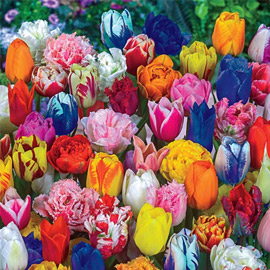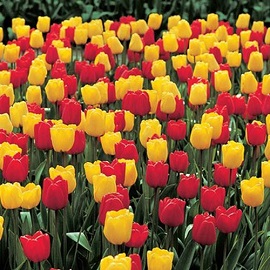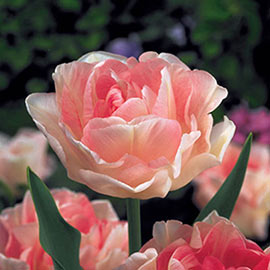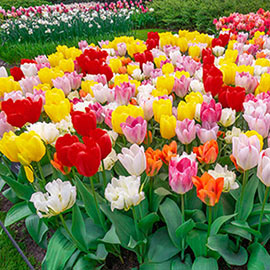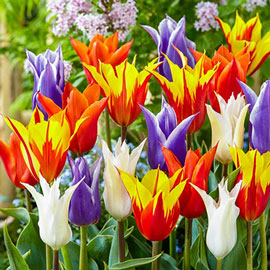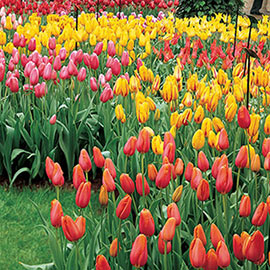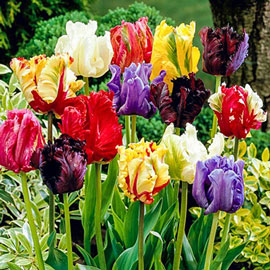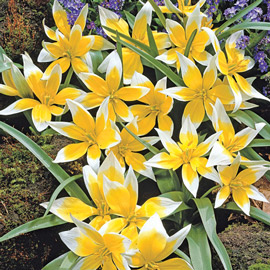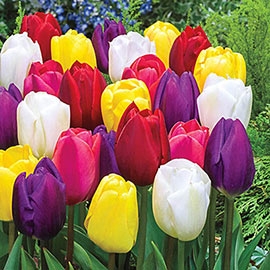Which Tulip Flowers for Sale Should I Buy?
For a spring floral display, you can't go wrong with tulip bulbs. If you're looking to fill large garden beds or landscape, consider
buying tulip bulbs in bulk for a cost-effective and impactful option. Traditional favorites for springtime gardens, tulips come in so many colors, forms, and types, your customers will have a hard time deciding which ones they like best. Choose from several types of tulip bulbs for sale such as:
Darwin Hybrid Tulips—Feature traditional egg-shaped blooms, bold colors and long, sturdy stems. Blooming in mid to late spring, they're reliably perennial.
Double Flowering Tulips—Large, luxuriant blooms resemble peonies. Available in rich colors, they give gardens a unique look.
Fosteriana Tulips—Blooming in early spring, they're a great choice to kick off tulip season. Looks impressive in mass plantings.
Lily Flowering Tulips—Give gardens a sophisticated, chic look. Available in bright hues, they look exceptional in borders and will draw the eye to the property.
Mayflowering Tulips—A great way to extend the tulip season, these tulips bloom in late spring. Featuring classically shaped blooms, they're available in a variety of colors.
Parrot Tulips—Flamboyant blooms feature vibrant splashes of color and fringed petals. These sought-after tulips are ideal for mass plantings where their flowers are appreciated even from a distance.
Species Tulips—Low-growing tulips with exotically shaped blooms bring flair to rock gardens and front borders. Early blooming variety looks best planted in groups and naturalizes well.
We also suggest designer-inspired blends and mixtures that take the guesswork out of planting.
When selecting tulip bulbs to buy, consider bloom time. The best landscapes include early season, mid-season and late season tulip varieties, so tulips can be enjoyed for months. Next, take into account the tulip variety's height. Finally, consider the tulip variety's form and color and the statement you want it to make in the landscape. Tulips with unusual flower forms, such as Double Flowering, Lily Flowering and Parrot Tulips, delight garden visitors and draw them in for a closer look.
Tulips make outstanding additions to bulb gardens, mixed borders and mass plantings. Plus, they are easy to grow. So, whether they select their favorites by color or form, your customers are sure to find the perfect tulip bulbs for their garden projects.
K. van Bourgondien has supplied gardeners with flower bulbs for more than 175 years and understands that the best tulip displays start with top-quality bulbs and top-performing varieties. We offer tulip bulbs for sale online that will produce outstanding tulips with brilliant color and form. Tulips look best when planted en masse or large groups, and K. van Bourgondien makes it economical to plant large displays of tulip bulbs that are sure to brighten landscapes when they bloom in the spring. Our plump, high-quality tulip bulbs are delivered to you for fall planting.
How Do I Plant Tulip Bulbs
Set the tulip bulbs 4-8" deep and 4-8" apart, depending on size and variety. After the ground has frozen in winter, mulch with straw or hay. After flowering, remove the head of the tulip but allow the stem and foliage to die back naturally. Tulips perform best in their first year; many gardeners treat them as annuals, discarding the plants after they finish blooming. Extensive testing in recent years has proven that if a slow-release fertilizer is applied, you can expect more than one year of flowers out of most varieties of tulips. Many early-flowering species, as well as Darwin Hybrid Tulips, come back year after year with no effort.
When Do I Plant Tulip Bulbs
To ensure successful growth and vibrant blooms, you should plant tulip bulbs in late fall, specifically when the weather starts to cool down and the soil temperature drops. Late September to early November is usually the ideal time, depending on your specific location and climate.
When selecting the planting site, opt for an area with humus-rich soil that is sandy and well-drained. Tulips thrive in loose, fertile soil that allows for proper root development and prevents waterlogging.
To promote healthy growth and abundant flowering, choose a location that receives at least 5-6 hours of sunlight each day. Tulips are sun-loving plants, and while they can tolerate partial shade, full sun is preferred to maximize their potential.
Tulip Planting and Growing Tips
Tulips are often planted in rows, but the result is a formal look, much like soldiers lined up in ranks. For a more informal look, plant your tulip bulbs in groups of 5-11 or more in natural swathes. The best advice we can give is to "plant bouquets." Plant several different varieties of tulips throughout the garden to extend the blooming time. Tulip bulbs are hardy in
garden zones 3-8.
In zones 8-10, refrigerate the tulip bulbs for about 8 weeks at 40-45° F. In the garden, plant the tulip bulbs after Nov. 1; 6- 8" deep in a lightly shady area to keep the bulbs as cool as possible. Dig and discard the tulips after they bloom.
See our
Tulip Planting Guide for more information on how to plant, grow, and care for your tulips.
How Do I Store Tulip Bulbs?
Even though tulip bulbs are hardy throughout the United States, some gardeners like to dig them up and store them. To store tulip bulbs, wait until the foliage has turned yellow and withered after blooming. Carefully dig up the bulbs, remove any excess soil, and allow them to dry completely. Store the bulbs in a cool, dry place with good air circulation, such as a mesh bag or a cardboard box filled with peat moss or vermiculite, until you are ready to plant them again in the fall.
 MENU
MENU Plant Finder
Plant Finder
 Help
Help


